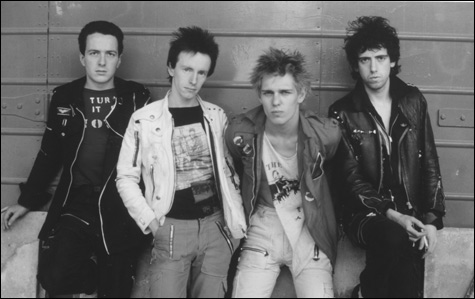
FATED: Strummer (left, with Headon, Simonon, and Jones in the Clash) was a rock star who hated rock stars, an egalitarian punk with a ruthless Machiavellian streak. |
Joe Strummer was the embodiment of punk, up till his final day, December 22, 2002. It was a congenital heart defect that got him — something that could have killed him as a student at Newport College of Art in ’73, or during his squatter years with the 101’ers, the pub-rockers who prepared him for the challenges of the Clash. Instead, he died peacefully, asleep in his comfortable cottage in Broomfield, a tiny farming village nestled in the Sedgemoor district of Somerset, 160 miles southwest of London. It could have been tragic: in the years following the end of the Clash, Strummer had entered a deep depression. Except for a few odd jobs (a tour fronting the Pogues; collaborating with Mick Jones on the second Big Audio Dynamite album), he was lost in the wilderness. But by 2002, he was back in top form, having nearly completed his third album with the Mescaleros, the group who brought him back into the spotlight as a frontman, a songwriter, and a punk icon. After the initial shock of his death passed, it felt somehow right, as if his work here were complete and he’d simply moved on.
In fact, for much of his life, as told in Chris Salewicz’s exhaustive new biography Redemption Song: The Ballad of Joe Strummer (Faber and Faber), and in Julien Temple’s new two-hour bio-pic The Future Is Unwritten (opening at the Coolidge Corner this Friday), Strummer seems to have been blessed by the fates. He was given to consulting the I Ching. Paul Buck was one of many friends who were around for John Mellor’s transformation from “Woody” Mellor — a middle-class world-traveled British diplomat’s son — to Joe Strummer. As Buck recounts in Redemption Song, one of Strummer’s big “Should I stay or should I go” dice throws was rigged. It was after he’d been asked to front an as-yet-unnamed punk band with Mick Jones and Paul Simonon. It would mean leaving his friends, the 101’ers. According to Buck, the I Ching advised, “Stay with your friends.” So Strummer “conveniently decided that his ‘friends’ were the Clash,” Buck notes, while wryly observing that it’s “an extraordinarily hippie way to decide to join a punk group.”
There was a certain Machiavellian ruthlessness in that move. Yes, he was deserting a rag-tag crew of squatters. But these people —particularly Tymon Dogg, an unsung folk hero who’d mentored the young Mellor — had fostered the creation of Joe Strummer, the rebel rocker ready to take on the world with his typewriter and his Telecaster. It was a pattern that carried over to the Clash, where in quick order second guitarist Keith Levene was sacked, then original drummer Terry Chimes. Later, Topper Headon, the drummer whose talents (along with Mick’s) propelled punk into uncharted territory, had the misfortune of being sacked just as the Combat Rock song he’d built from the bottom up, “Rock the Casbah,” was breaking worldwide. And, most famously, Strummer and Simonon gave Jones the boot in ’83 — a premature end to one of rock’s great songwriting teams.